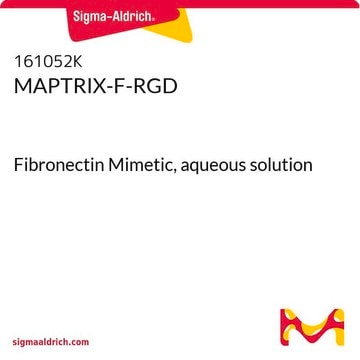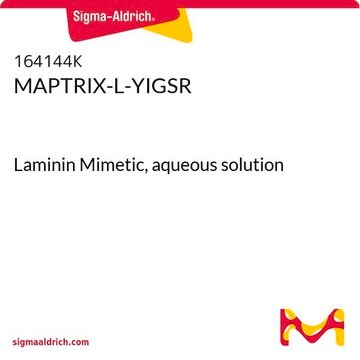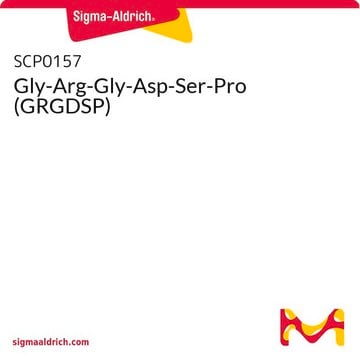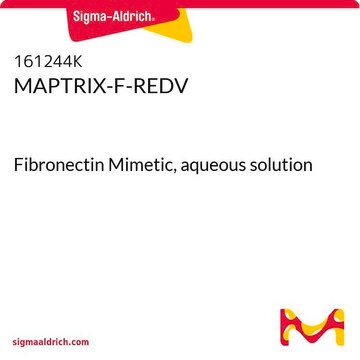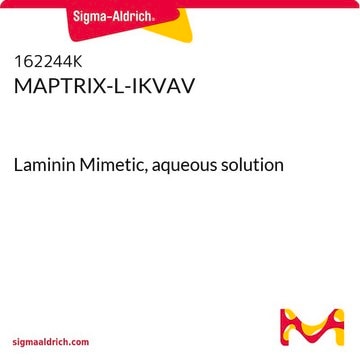161054K
MAPTRIX-F-RGD
Fibronectin Mimetic, aqueous solution
Sign Into View Organizational & Contract Pricing
All Photos(1)
About This Item
UNSPSC Code:
12352202
NACRES:
NA.75
Recommended Products
sterility
Filtered sterilized solution
form
aqueous solution
mol wt
~23.0 kDa
packaging
pkg of 10 mg
concentration
1.0 mg/mL protein
technique(s)
cell culture | mammalian: suitable
Binding Specificity
Receptor: αvβ3, αvβ5
Domain: FNIII-10
Binding Motif: RGD
shipped in
ambient
storage temp.
2-8°C
Application
MAPTrix™ Technology provides a true extracellular microenvironment (ECM) by presenting combinatorial peptide motifs. The ECM, defined by biochemical cues and physical cues, is a deciding factor in a wide range of cellular processes including cell adhesion, proliferation, differentiation, and expression of phenotype-specific functions.Currently existing technology offers simple and merely adequate environments that facilitate simple cell processes such as cellular adhesion. The simple presentation of cell adhesion motifs is not optimal for controlling more integrated processes. Crosstalk among signaling pathways act synergistically to enhance cellular responses such as cell adhesion or proliferation. A study showed that a combination of extracellular matrix derived peptides presented on a surface may enhance cell adhesion strength and focal adhesion assembly. The combinatorial presentation of ECM peptides on cell growth surfaces may also promote elevated proliferation rates of primary or stem cells.
Features and Benefits
- Biochemically-defined, animal-free cell culture surfaces designed to enhance cell performance
- MAPTrix™ produces a uniform ECM surface that provides a highly controlled 2D extracellular microenvironment for cell cultures and related applications
- Adhesion properties of the mussel adhesive protein makes the coating reproducible & reliable
Legal Information
MAPTrix is a trademark of Kollodis Biosciences
Storage Class Code
10 - Combustible liquids
Flash Point(F)
Not applicable
Flash Point(C)
Not applicable
Certificates of Analysis (COA)
Search for Certificates of Analysis (COA) by entering the products Lot/Batch Number. Lot and Batch Numbers can be found on a product’s label following the words ‘Lot’ or ‘Batch’.
Already Own This Product?
Find documentation for the products that you have recently purchased in the Document Library.
S J Fashena et al.
Nature cell biology, 2(12), E225-E229 (2001-01-09)
Over the past twenty years, intensive research has enabled us to identify components of specific signalling pathways downstream of an array of adhesion and growth-factor receptors. The first Gordon Research Conference on 'Signalling by Adhesion Receptors', which took place in
Catherine D Reyes et al.
Journal of cellular physiology, 217(2), 450-458 (2008-07-10)
Cell adhesion to extracellular matrix (ECM) components through cell-surface integrin receptors is essential to the formation, maintenance and repair of numerous tissues, and therefore represents a central theme in the design of bioactive materials that successfully interface with the body.
Ying Meng et al.
FASEB journal : official publication of the Federation of American Societies for Experimental Biology, 24(4), 1056-1065 (2009-11-26)
Human embryonic stem (hES) cells are pluripotent, capable of differentiating into any cell type of the body, and therefore have the ability to provide insights into mechanisms of human development and disease, as well as to provide a potentially unlimited
Samuel Schmidt et al.
Cell and tissue research, 339(1), 83-92 (2009-11-19)
Adhesion and migration are integrated cell functions that build, maintain and remodel the multicellular organism. In migrating cells, integrins are the main transmembrane receptors that provide dynamic interactions between extracellular ligands and actin cytoskeleton and signalling machineries. In parallel to
Seung Tae Lee et al.
Biomaterials, 31(6), 1219-1226 (2009-11-21)
We present development and use of a 3D synthetic extracellular matrix (ECM) analog with integrin-specific adhesion ligands to characterize the microenvironmental influences in embryonic stem cell (ESC) self-renewal. Transcriptional analysis of 24 integrin subunits followed by confirmation at the translational
Our team of scientists has experience in all areas of research including Life Science, Material Science, Chemical Synthesis, Chromatography, Analytical and many others.
Contact Technical Service